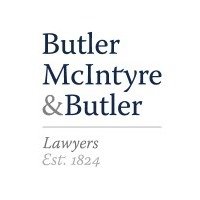Best ADR Mediation & Arbitration Lawyers in Hobart
Share your needs with us, get contacted by law firms.
Free. Takes 2 min.
List of the best lawyers in Hobart, Australia
About ADR Mediation & Arbitration Law in Hobart, Australia
Alternate Dispute Resolution (ADR), Mediation, and Arbitration are increasingly popular methods of resolving disputes outside the traditional court system in Hobart, Australia. These methods offer more flexible, cost-effective, and quicker resolutions. Mediation involves a neutral third-party mediator assisting parties in reaching a mutually satisfactory agreement. Arbitration, on the other hand, involves an arbitrator making a binding decision after hearing both parties' arguments. Hobart has a robust legal framework to support ADR processes, reflecting a combination of state and federal legislation aimed at facilitating effective dispute resolution.
Why You May Need a Lawyer
Legal assistance in ADR Mediation & Arbitration can be crucial in various situations, including:
- Understanding your rights and obligations under an existing contract that includes an ADR clause.
- Preparing for mediation or arbitration sessions to ensure your interests are adequately represented.
- Drafting or reviewing settlement agreements resulting from mediation.
- Guidance on the enforceability of arbitration awards.
- Representation in arbitration proceedings to present and argue your case effectively.
- Navigating complex legal and procedural issues that may arise during ADR processes.
- Assisting in cases where there is an imbalance of power or sophisticated legal issues.
Local Laws Overview
In Hobart, key legislation relevant to ADR includes the Australian Commercial Arbitration Act 2011, which aligns with the Model Law on International Commercial Arbitration, ensuring consistency with international standards. The Tasmanian Civil and Administrative Tribunal (TASCAT) also facilitates mediation for various disputes under their jurisdiction. Additionally, the Family Law Act 1975 encourages mediation in family disputes. Tasmania's legal framework for ADR is designed to promote fair, quick, and effective resolution of disputes, reducing the reliance on the court system.
Frequently Asked Questions
What is the difference between mediation and arbitration?
Mediation involves a third-party facilitator who helps parties reach a voluntary agreement, while arbitration involves a binding decision made by an arbitrator based on the presented evidence.
Do I need a lawyer for ADR processes?
While not legally required, having legal assistance can be beneficial for understanding complex legal issues, preparing for proceedings, and ensuring your rights are protected.
Are ADR outcomes legally binding?
Mediation agreements, if documented, can be made legally binding with both parties' consent. Arbitration decisions are generally binding and enforceable.
How much does ADR cost compared to court proceedings?
ADR is typically more cost-effective than traditional court litigation, as it usually involves fewer procedural requirements and expedited timelines.
What types of cases are suitable for ADR?
ADR can be used for a wide range of disputes, including commercial, contractual, family, workplace, and consumer matters.
Can I be forced to participate in ADR?
Participation in mediation is generally voluntary unless ordered by a court. Arbitration can be mandatory if stipulated in a contract's ADR clause.
What happens if the ADR process fails to resolve the dispute?
If ADR does not result in a resolution, parties may still have the option to pursue traditional litigation unless otherwise agreed.
How can I enforce an arbitration award?
Enforcement is generally straightforward, as arbitration awards can be registered with the court, becoming enforceable as a judgment.
Is ADR confidential?
ADR processes are typically private and confidential, allowing parties to negotiate without public exposure of sensitive information.
Can ADR be used for international disputes?
Yes, ADR is often used in international disputes, benefitting from standard procedures that comply with global conventions such as the New York Convention on the Recognition and Enforcement of Foreign Arbitral Awards.
Additional Resources
For those seeking more information, the following resources may be helpful:
- Tasmanian Legal Aid - Provides general legal guidance and resources on ADR.
- The Resolution Institute - Offers resources and professional help in mediation and arbitration.
- Law Society of Tasmania - Can provide referrals to ADR professionals and resources.
- Australian Centre for International Commercial Arbitration (ACICA) - Offers support for international arbitration matters.
Next Steps
If you require legal assistance in ADR Mediation & Arbitration, consider the following steps:
- Consult with a specialized ADR lawyer to discuss the particulars of your case and obtain tailored advice.
- Gather relevant documents such as contracts, previous correspondence, and any prior agreements.
- Consider whether you prefer mediation or arbitration based on your specific needs and the nature of the dispute.
- Contact local legal aid resources or professional associations for further guidance or to find a qualified legal professional in Hobart.
Lawzana helps you find the best lawyers and law firms in Hobart through a curated and pre-screened list of qualified legal professionals. Our platform offers rankings and detailed profiles of attorneys and law firms, allowing you to compare based on practice areas, including ADR Mediation & Arbitration , experience, and client feedback.
Each profile includes a description of the firm's areas of practice, client reviews, team members and partners, year of establishment, spoken languages, office locations, contact information, social media presence, and any published articles or resources. Most firms on our platform speak English and are experienced in both local and international legal matters.
Get a quote from top-rated law firms in Hobart, Australia — quickly, securely, and without unnecessary hassle.
Disclaimer:
The information provided on this page is for general informational purposes only and does not constitute legal advice. While we strive to ensure the accuracy and relevance of the content, legal information may change over time, and interpretations of the law can vary. You should always consult with a qualified legal professional for advice specific to your situation.
We disclaim all liability for actions taken or not taken based on the content of this page. If you believe any information is incorrect or outdated, please contact us, and we will review and update it where appropriate.








